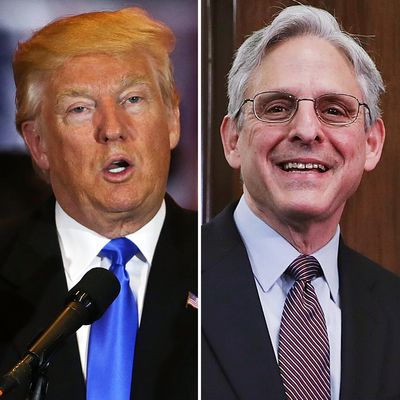
On February 13, when Antonin Scalia died, Senate Republicans immediately — within minutes, actually — settled on a position that the next president, rather than the current one, should name his successor. At the moment they devised this plan, that next president could have been anybody, and seemed likely to be somebody other than Donald Trump, whose odds of winning the nomination, according to betting markets, stood at about 45 percent. The possibility that Trump might win certainly had occurred to Republican senators, but it loomed hazily in the background while the Supreme Court fight had occupied the foreground. Republicans probably figured that, should Trump somehow win the nomination, their vulnerable candidates could always find a way to distance themselves. What they did not seem to calculate was that their Court position would become a trap binding them to Trump.
Now that the GOP primary has resolved itself, the Republican stance is not that “the next president” should replace Scalia, but that Donald Trump should replace Scalia. They are specifically pledging themselves to abide by the Donald’s judicial judgment. Charles Grassley, chairman of the Senate Judiciary Committee, told the Des Moines Register, “Based upon the type of people he’d be looking for, I think I would expect the right type of people to be nominated by him to the Supreme Court.”
Grassley himself is facing a reasonably stiff challenge this fall, as are several other Republican incumbents, all of whom have to decide whether to join Grassley. Rhetorically distancing themselves from Trump is no longer a possibility. Either they accept President Obama’s choice for the Court, Merrick Garland, or they go with Trump’s.






























